n August 1901, about 600 citizens of Colorado Springs gathered at Perkins Hall on the Colorado College campus, where the Hassell Iron Works sealed the Chest. The Century Chest then remained on the Colorado College campus for 100 years.
Louis Ehrich, a Colorado Springs businessman, spearheaded the Century Chest project, a gathering of letters, photographs, and other materials to be placed in a metal chest as a kind of time capsule for 1901. The letters and documents were inside linen envelopes, and many of the photographs were wrapped in real tin foil. The Century Chest itself is about the size of a small safe, and is made of steel and lined with sheets of lead. It was sealed with two hundred rivets to make it airtight. An inscription on the chest reads: "To the citizens of Colorado Springs of the Twenty First Century. To be opened after midnight December 31st A.D. 2000."
One of the items was titled "Letter - Descendants of Henry H. Cooper and Elizabeth Latshaw Cooper". The transcription has been copied below:
Colorado Springs, Colo. Aug. 5, 1901.
Lived at 1420 North Weber St.
To the decendents (sic) of H.H. Cooper and Elizabeth Latshaw Cooper, (Nee Elizabeth C. Latshaw) Married Aug. 26th 1876. From this union five children were born.
Nellie L. Cooper, born Nov. 8th 1877. Lee Edwin Cooper, born Feb. 22nd, 1883. Marjorie C. Cooper, born April 6th, 1886. Katherine H. Cooper, born July 20th, 1888. Ruth E. Cooper, born June 21st, 1891.
The writer H.H. Cooper had four brothers and four sisters who reached manhood and womanhood. James, Thomas, Edwin and Rollin, Julia, Eliza, Ellen and Belle. My father and mother were born in Vermont and moved to Lima, Michigan in 1832, which at that time was but a wilderness and on the extreme frontier. In 1860 and 1861 most all of those enumerated above came to Colorado including the writer. At that time, Colorado was inhabited almost exclusively by Indians. The Ute, Commanche (sic), Apache, Sioux, Cheyenne and Arapaho tribes. The two former were disposed to be friendly to the white man but the latter tribes were continually at war with us killing and scalping whenever an opertunity [sic] occured [sic]. This warfare continued from 1861 to 1870, when the Indians, including all of the above tribes were driven north into Montana and south to the border of old Mexico. The Sioux, Arapaho and Cheyenne going north, and the Apache and Commanche (sic) south with the exception of the Ute tribes, three in number, retained their hunting grounds in the mountains of Colorado, Wyoming & Utah for a long time.
It will seem strange to the people of the twentieth century how a handful of pioneers with their families could live and provide the necessaries of life for themselves, while surrounded by hostile tribes both on the east and on the west. This was done with comparitively [sic] small loss of life, strange as it may seem. In 1868 the Arapahoes came in and killed eight people, two of the number on the land Colorado Springs stands on now. But this was the last of the Indians being driven by large commands of troops from the country. Edwin G. Cooper died in 1865 and was buried in the old Colorado City graveyard situated on the present site of Colorado Springs, a little south of the Antlers Hotel. At that time I do not think there was a tree or board or stick of timber on all of the plate of country Colorado Springs now occupies except at the graveyard and along Monument Creek, and not over five hundred people in all of this section south of divide, twenty five miles north of here.
The reader of this will of course note the rise or fall of Cripple Creek Gold mining camp, thirty miles west of Colorado Springs, which the present year produced twenty three millions of gold and a little silver. The writer participated in the beginning and discovery of this Gold Camp in 1893, although really discovered in 1891 and mined therefrom about one hundred thousand dollars. It is my expectation and wish that the descendents may come up to the high moral character, ability, and womanly standard of Mrs. H.H. Cooper, (Nee Latshaw). We look with pride upon the wonderful progress in the sciences, Electricity, etc. What is will be in the year two thousand no one now can conceive.
Wishing your health and happiness my best wish.
Very Respectfully,
Henry H. Cooper
Source:
1. A Latshaw Family Journal - Compiled by Gary D. Smith
2. 1850 Census
3. 1900 Census
4. 1910 Census
5. 1920 Census
6. Letter - Descendants of Henry H. Cooper and Elizabeth Latshaw Cooper image transcription placed in the Colorado Springs Tutt Library Century Chest in 1901 and opened in 2001 pasted below.
http://www2.coloradocollege.edu/library/specialcollections/centurychest/transcription91.html
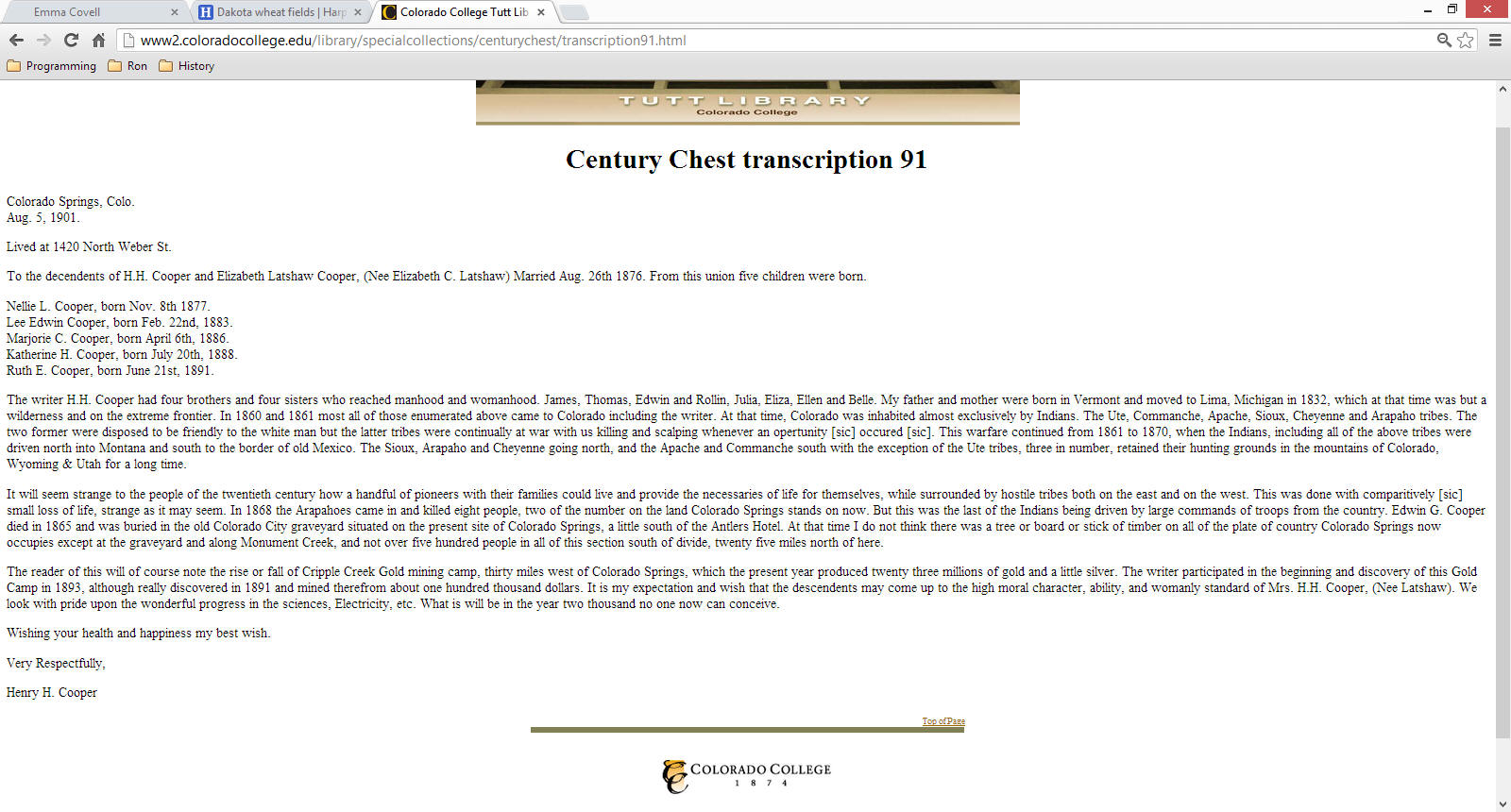
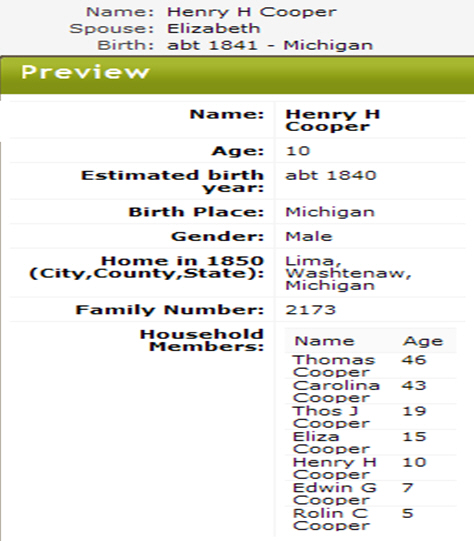
1850 Census
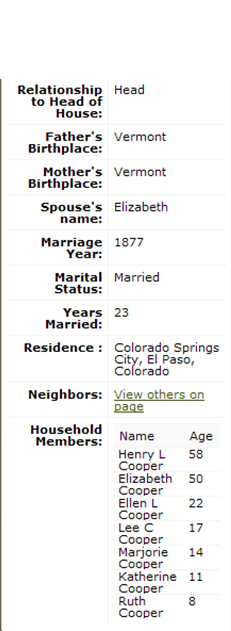
1900 Census
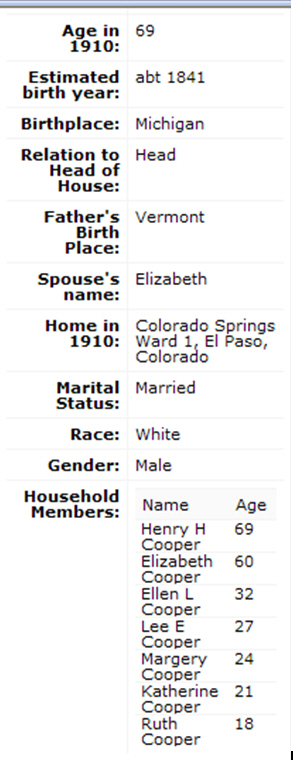
1910 Census
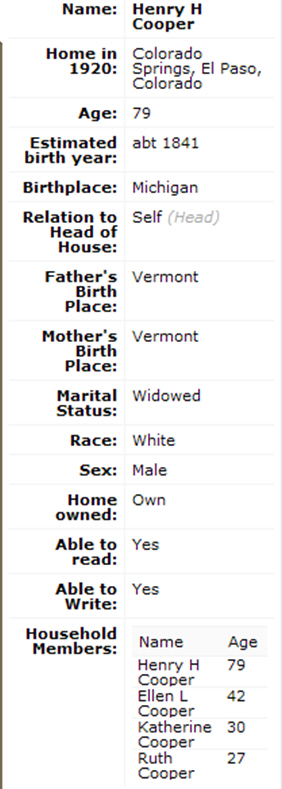
1920 Census